Statement on the Contemplated Resumption of Oil Extraction in Ogoni Land
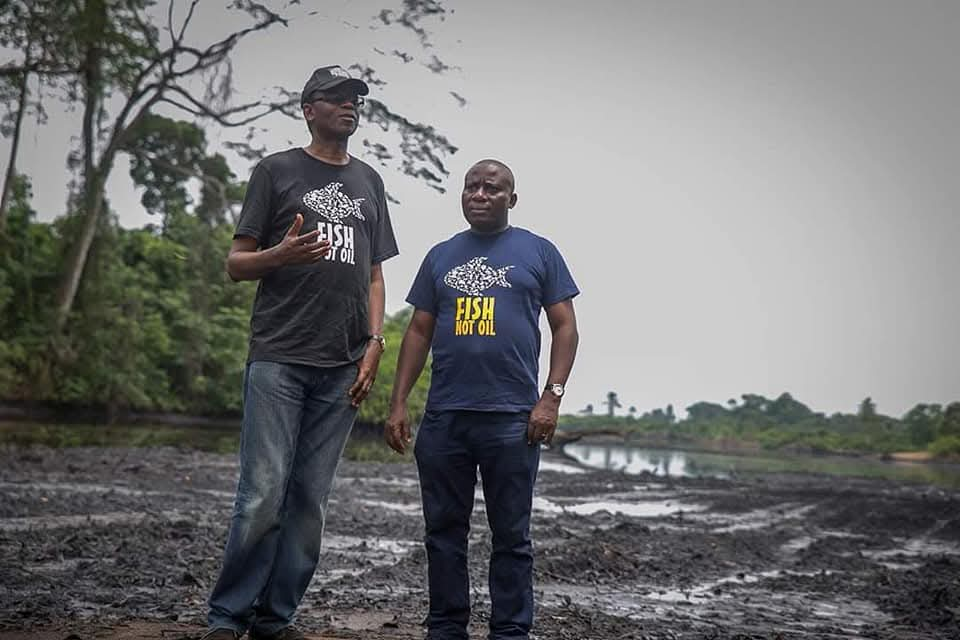
We endorse the statement from allied civil society organizations that, concerned about the catastrophic consequences of oil spills, gas flaring, and poor remediation efforts, which have left the land, water, and air severely polluted, condemn the planned resumption of oil extraction in Ogoniland, Rivers State. Concerned civil society organisations in the Niger Delta met at the Port Harcourt office of Environmental Rights Action/Friends of the Earth Nigeria to deliberate on the recent invitation by the office of the National Security Adviser to the President, Mr Nuhu Ribadu to some Ogoni leaders and stakeholders to a private meeting in Abuja to discuss the resumption of oil production in Ogoniland. While recognising and condemning the nations dependence on fossil fuel, it is however insensitive for this administration to open any form of discussion with handpicked group of Ogoni leaders for such talks, noting that the overall will of the majority of Ogonis is -paramount in this matter. The groups expressed their unequivocal condemnation of the planned resumption of oil exploration and production activities in Ogoniland. This decision disregards the enduring environmental, social, and economic injustices faced by the Ogoni people and undermines efforts toward sustainable development, environmental justice, community empowerment and cleanup of the devastated environment. Ogoniland has been a symbol of environmental degradation caused by decades of reckless oil exploitation and decrepit equipment. Reports, including the UNEP Environmental Assessment of Ogoniland of 2011, have documented the catastrophic consequences of oil spills, gas flaring, and poor remediation efforts, leaving the land, water, and air severely polluted. The livelihoods and health of the Ogoni people have suffered immeasurably, with no substantial accountability from the oil industry or adequate redress from the government. The groups explained that they had expected that this administration would have called for a multi stakeholder meeting in Ogoni land to listen to the plight of the Ogonis and also agree with them on how best to tackle the poverty and hunger occasioned by their loss of livelihoods caused by years of pollution and resultant poisoning of their land and waters. The forum noted with dismay that two major issues-June 12 and the Ogoni struggle were plaguing the nation when democracy was restored in 1999. The matter of June 12 has been settled with the federal government conferring a national honor of GCFR on MKO Abiola and also recognizing him as the hero of democracy. It is time, Ken Saro-Wiwa is recognized and honoured as the hero of the environment and given his due honour. Despite numerous calls for justice and transparency, the Nigerian government has been slow in the implementation of the UNEP report recommendations to clean up the land effectively. It is also on record that the government of Nigeria is reluctant to contribute to the ongoing cleanup of Ogoniland and is keeping a blind eye to the atrocious continuation of destructive oil activities across the Niger Delta. The attempt to resume oil extraction in a region already ravaged by environmental neglect further exacerbates the suffering of the people and is an affront on their right to a safe environment. It also disregards their right to free, prior, and informed consent, a fundamental principle under international law. We demand as follows: Halt all plans for resumption of oil extraction in Ogoniland until there is meaningful consultation with the Ogoni people and full remediation of the damaged environment. That not one more oil well should be drilled in the Niger Delta and the government, and the oil companies should commence immediate and total cleanup of the region. One trillion United States Dollars should be earmarked for immediate clean up of the Niger Delta and compensation for loss of livelihoods. Immediate review of the Kangaroo Military trial and execution of ken Saro-Wiwa with other martyrs and their exoneration. Immediate and unconditional release of the confiscated Ken Saro-Memorial Bus sculpture held by Nigeria Customs since 2015. Full Implementation of the UNEP Report and ensuring that the clean-up and restoration of Ogoniland are prioritized and carried out transparently and effectively. More funding should be allocated to HYPREP to hasten up their actions on the clean up. Ensure justice for the Ogoni People by addressing historical grievances, including compensation for environmental and economic losses and accountability for decades of ecological destruction. Community participation and a guarantee that decisions affecting Ogoniland follow the respect for the Free, Prior, and Informed Consent (FPIC) of the communities. Holding oil companies, particularly Shell, accountable for past environmental damages and human rights violations. Demilitarization of the Niger Delta and an end to the intimidation and harassment of environmental activists and local communities. Enforcing strict regulations on oil companies operating in Nigeria. Halt all discussions on divestment until the polluted Niger Delta region is cleaned up. Transitioning to renewable energy and reducing dependence on fossil fuels to mitigate environmental harm. The contemplated resumption of oil operations in Ogoniland poses a significant threat to the fundamental human rights of the Ogoni people and negates Nigeria’s effort at tackling climate change. These include the right to a clean and healthy environment, the right to health, and the right to life. Any attempt to impose extractive activities without addressing these historical injustices will only deepen the mistrust between the government, oil companies, and local communities. The resumption of oil activities in Ogoniland is not only a betrayal of the Ogoni struggle but also a threat to the environment and future generations and a false hope that colonial extractivism promotes positive development. We stand in solidarity with the Ogoni people in their fight for justice and sustainable development. Signed: Miideekor Environmental Development Initiative-MEDI Health of Mother Earth Foundation-HOMEF Corporate Accountability and Public Participation Africa-CAPPA Ogoni Solidarity Forum-Nigeria South South Youths Initiative Peoples Advancement Centre Environmental Rights Action Kebetkache Women Development & Resource Centre Social Action We The People Africa Network for Environment and Economic Justice-ANEEJ Lekeh Development Centre Rainbowwatch Development Centre Kalop Environmental Centre Pilex Centre CEE-HOPE HEDA Resource Centre Peace Point Development Foundation Civil Society Legislative Advocacy Centre-CISLAC
Defensa de los derechos de las mujeres Indígenas a través del sistema de las Naciones Unidas
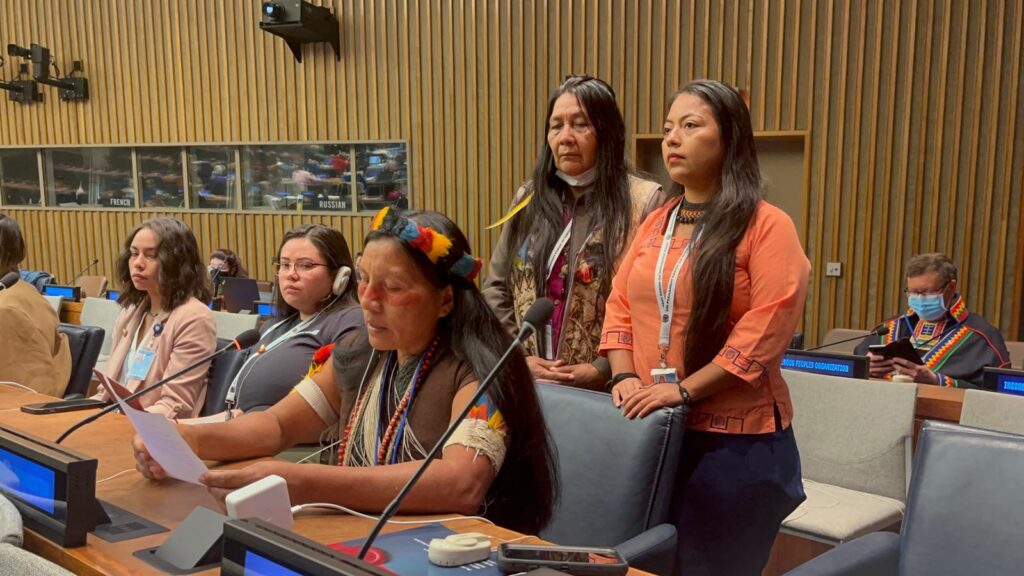
Certificado por la Universidad de Arizona Desarrollado en colaboración entre Land is Life y la Universidad de Arizona, este curso ofrece una oportunidad de aprendizaje para mujeres indígenas de las siete regiones socioculturales, brindándoles experiencia práctica en la interacción y navegación dentro del sistema de derechos humanos de las Naciones Unidas. Los estudiantes aprenderán de ponentes de alto nivel, incluidos Relatores Especiales de la ONU, líderes Indígenas y académicos distinguidos. Fechas tentativas para las presentaciones de los ponentes invitados: Semana Fecha Tema Semana 1 Marzo 20 de 2025 Marco Legal Semana 2 Marzo 27 de 2025 Declaración de las Naciones Unidas sobre los Derechos de los Pueblos Indígenas (DNUDPI) Semana 3 Abril 3 de 2025 Abogacía: Mecanismo Experto sobre los Derechos de los Pueblos Indígenas y el Foro Permanente de las Naciones Unidas para las Cuestiones Indígenas. Semana 4 Abril 10 de 2025 Procedimientos Especiales Semana 5 Abril 17 de 2025 Órganos de Tratados Semana 6 Abril 24 de 2025 Examen Periódico Universal (EPU) Semana 7 Mayo 1 -7 de 2025 Presentaciones Finales de los Participantes
Open call for applications Online course: Advocating for Indigenous Women’s Rights through the UN System.

Certificate course offered by the University of Arizona Developed in collaboration between Land is Life and the University of Arizona, this course provides a learning opportunity for Indigenous women from across the seven socio-cultural regions to gain hands-on experience in engaging with and navigating the United Nations’ human rights system. Students will learn from high-level guest speakers, including UN Special Rapporteurs, Indigenous leaders, and distinguished scholars. Tentative dates for the guest speakers’ presentations: WEEK DATE TOPIC Week 1 March 20, 2025 Legal Framework Week 2 March 27, 2025 United Nation Declaration on the Rights of Indigenous Peoples (UNDRIP) Week 3 April 3, 2025 Advocacy:Expert Mechanism on the Rights of Indigenous Peoples and the United Nations Permanent Forum on Indigenous Issues Week 4 April 10, 2025 Special Procedures Week 5 April 17, 2025 Treaty Bodies Week 6 April 24, 2025 Universal Periodic Review Week 7 May 1-7, 2025 Final Presentations by Participants
Stop the 11,000 MW Siang Dam: Honor Indigenous Rights In Arunachal Pradesh, India
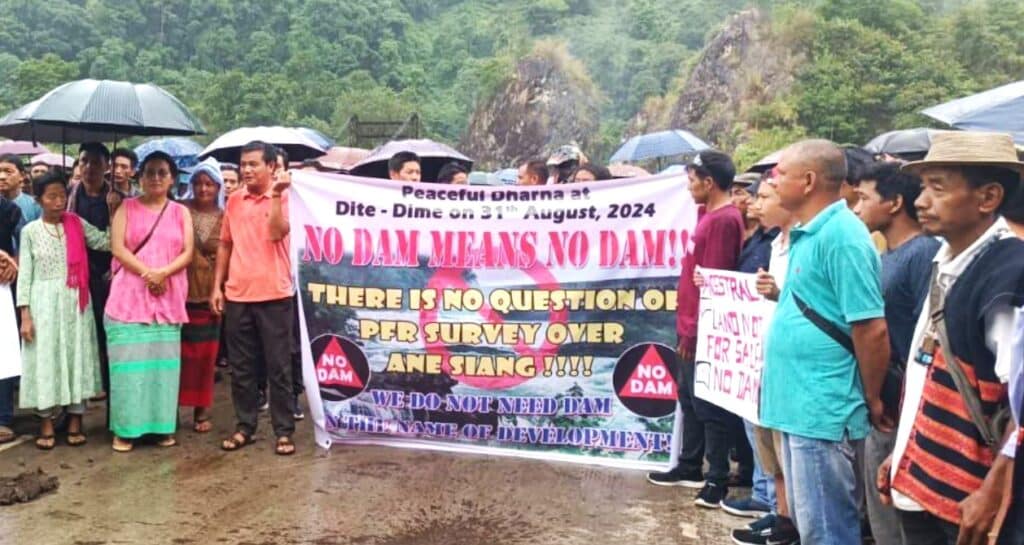
Land is Life calls on the Government of India to reconsider the pursuit of the 11,000 MW Siang Hydroelectric Project and other large-scale dams in Arunachal Pradesh and across North East India. It is deeply concerning that the Government of India is pushing forward with the construction of the Siang Dam on the Siang River without securing the free, prior, and informed consent of the Adi and other affected Indigenous Peoples in Arunachal Pradesh. The Adi tribe has called for the recognition of their rights, urging consideration of the potential impacts of the dam on their land, livelihoods, culture, and identity, particularly regarding involuntary displacement, land grabbing, the influx of non-Indigenous populations, and militarization. They have further called for a halt to the dam’s construction on their ancestral lands and territories. The Government of Arunachal Pradesh’s notification on December 6, 2024, to deploy Central Armed Police Forces in Siang District to facilitate the Pre-Feasibility Study of the Siang Dam has alarmed the Adi people. They view this notification as a direct attack on democratic decision-making processes in development and as an undemocratic resort to force. The Adi people are also deeply concerned about the potential for repressive actions and other human rights violations due to the militarization of their territory. The proposed 11,000 MW Siang Dam would have severe social, environmental, and cultural consequences for the Adi Indigenous Peoples and their land. In addition to the local impacts, the dam would cause significant downstream effects, such as widespread flooding in Assam. The disaster risk posed by the dam is further heightened by the region’s high seismic activity and the effects of climate change, including glacier melting and deforestation in the Himalayan region. Land is Life urges the Government of India to halt the 11,000 MW Siang Hydroelectric Project and to cease the militarization of Indigenous territories for dam construction. The demands of the Adi Indigenous Peoples must be fully respected, in line with the UN Declaration on the Rights of Indigenous Peoples, 2007.
Land is Life en la COP16
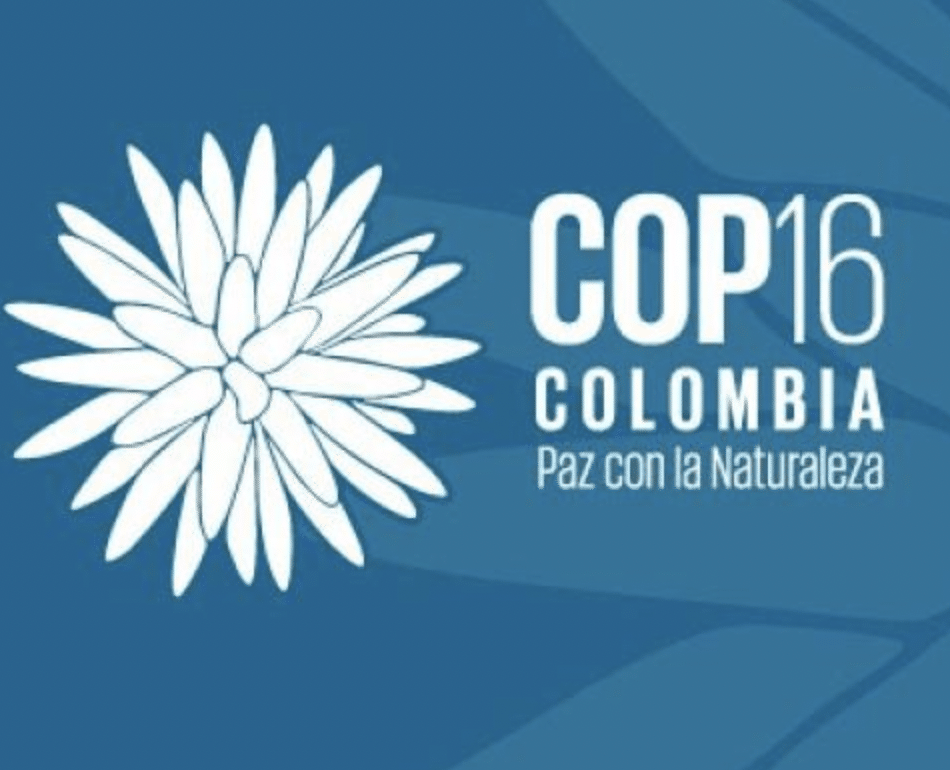
El segundo país más biodiverso del planeta recibe a la COP16 de biodiversidad durante el 21 y el 1 de noviembre de 2024. Delegaciones de 196 países se reúnen en Cali para informar cómo han traducido en acciones nacionales los objetivos del Marco Mundial de Diversidad Biológica Kunming-Montreal, establecidos en la COP15. También presentarán sus avances en la implementación del marco de diversidad biológica y Planes de Acción nacionales concretos. Desde Land is Life estamos convencidos de que no es posible garantizar la protección de la biodiversidad sin sus guardianes: los Pueblos Indígenas. Las mujeres Indígenas están listas para contribuir a los procesos de toma de decisiones en todos los niveles. Procedentes de las siete regiones socioculturales, ellas se han movilizado para impulsar su agenda en Cali y nosotros las acompañamos en dos eventos particulares: Elevando voces, asegurando futuros: Participación de los Pueblos y las mujeres Indígenas en movilización de recursos para la biodiversidad.Cuándo: 24 de octubre, a las 3:00 P.M Dónde: Zona Azul. Salón Nuquí – Salón Academia e Investigación Plaza Uno. Interpretación disponible: ESP- ENG 2. Protectoras de la vida: Mujeres Indígenas preservando la biodiversidad Cuándo: 30 de octubre, 12:30 P.M Dónde: Zona Azul. Pabellón de América Latina y el Caribe, la BIOdiversidad nos une. Con ánimo de aportar a la conversación, contribuir al posicionamiento de los Pueblos Indígenas en estos espacios y resaltar su rol en la protección y fomento de la biodiversidad; compartimos los siguientes documentos: El compromiso que necesitamos 17 financiadores anunciaron un compromiso histórico de US$1.7 mil millones en la COP26, en 2021, para avanzar en los derechos de tenencia forestal en países con bosques tropicales entre 2021 y 2025. En anticipación del anuncio de una Promesa 2.0, un grupo de 45 organizaciones de Pueblos Indígenas de África, Asia, América Latina, el Ártico y el Pacífico proporcionan recomendaciones estratégicas e ideas para informar y fortalecer los debates y resultados de la Promesa 2.0. 10 Razones por las que no se debe asociar a los Pueblos Indígenas con el término comunidades locales Tras la adopción de la Declaración de las Naciones Unidas sobre los derechos de los Pueblos Indígenas en 2007, se formó un consenso internacional en torno a la naturaleza específica de los Pueblos Indígenas. Los Estados comenzaron a alinear su terminología con el reconocimiento de los Pueblos Indígenas en la Declaración. Cuestiones clave que se abordarán en la COP16 Este documento es el resultado de cinco seminarios web que representaron una oportunidad para desarrollar la capacidad y los conocimientos de las mujeres y jóvenes Indígenas para su participación en la COP16 que tendrá lugar del 21 de octubre al 1 de noviembre de 2024 en Cali, Colombia. Estos son los temas a discutir y el papel de los pueblos indígenas en las próximas negociaciones
Land is Life at COP16

The second most biodiverse country on the planet will host COP16 on biodiversity from October 21 to November 1, 2024. Delegations from 196 countries will gather in Cali, Colombia, to report on how they have translated the goals of the Kunming-Montreal Global Biodiversity Framework, established at COP15, into national actions. They will also present their progress on implementing the biodiversity framework and concrete National Action Plans. At Land is Life, we are convinced that it is impossible to ensure the protection of biodiversity without its guardians: Indigenous Peoples. Indigenous women are ready to contribute to decision-making processes at all levels. Coming from seven sociocultural regions, they have mobilized to advance their agenda in Cali, and we will support them at two specific events: Raising voces, securing futures: Participation of Indigenous Peoples and women in Resources mobilization for biodiversity. When: October 24, at 3:00 PM Where: Zona Azul. Nuquí Room – Academia and Research Plaza Uno.Interpretation available: ESP-ENG 2. Protectors of Life: Indigenous Women Preserving Biodiversity. When: October 30, at 12:30 PMWhere: Zona Azul. Pabellón de América Latina y el Caribe, BIOdiversidad nos une. In the spirit of contributing to the conversation, supporting the positioning of Indigenous Peoples in these spaces, and highlighting their role in the protection and promotion of biodiversity, we share the following documents: The Pledge We Need Seventeen funders announced a historic commitment of $1.7 billion at COP26 in 2021 to advance forest tenure rights in tropical forest countries from 2021 to 2025. In anticipation of the announcement of a Promise 2.0, a group of 45 Indigenous Peoples organizations from Africa, Asia, Latin America, the Arctic, and the Pacific provide strategic recommendations and ideas to inform and strengthen the discussions and outcomes of Promise 2.0. 2. 10 Reasons Why Indigenous Peoples Should Not Be Associated with the Term Local Communities Following the adoption of the United Nations Declaration on the Rights of Indigenous Peoples in 2007, an international consensus was formed around the specific nature of Indigenous Peoples. States began to align their terminology with the recognition of Indigenous Peoples in the Declaration. 3. Key Issues to be Addressed at COP16This document is the result of five webinars that represented an opportunity to develop the capacity and knowledge of Indigenous women and youth for their participation in COP16, which will take place from October 21 to November 1, 2024, in Cali, Colombia. These are the topics to be discussed and the role of Indigenous Peoples in the upcoming negotiations.
CARBON TRADING IS NOT WORKING: strict regulation of offset projects is essential for affected Indigenous Peoples

Hopes are not high for the COP 28 conference in Dubai, especially given the presence of a huge number of oil industry delegates, but the meeting has focused attention on a number of serious issues, and could serve as a vehicle for action to right some of the most glaring injustices. The first of these is carbon trading, with its generally poor results and control over large territories in the name of Conservation: in some cases for 90 years or more. Control that is a major problem for the Indigenous People who live in these areas. A prime example is the deals signed by the United Arab Emirates based company Blue Carbon, and a number of African countries. According to the UK newspaper The Guardian, the company has signed deals that cover a fifth of Zimbabwe, 10% of Liberia, 10% of Zambia and 8% of Tanzania, a total of approximately 24.5 million Ha., together with a deal with the government of Kenya that involves an as yet unspecified area, but said to be millions of hectares. Blue Carbon, operated by Sheikh Ahmed Dalmook Al Maktoum, has been in operation for only a year, and has no experience in managing carbon offset deals. As far as can be determined, the company has had no negotiations with the Indigenous Peoples who will be impacted by these deals, nor plans or policies in place to ensure the protection of their rights. The agreement with Kenya highlights the issues and contradictions of carbon trading. On the one hand, William Ruto, the President of the country, has been creating for himself a profile as a energetic African climate defender, championing private sector investment in the continent, even being cited by Time magazine as one of Africa’s climate leaders. At the Africa Climate Conference in June of this year Ruto claimed the continent’s carbon sinks were an “unparalleled economic goldmine”. On the other hand, Ruto’s government has been displacing hundreds of Ogiek people from the Mau Forest Complex in Eastern Kenya, where they have lived for centuries, evictions that according to the Ogiek’s lawyers, are likely a result of the deal with Blue Carbon. The case is symptomatic. Not only were the Ogiek never consulted about the conservation deal with the UAE company, a violation of their fundamental right, but are now considered by Ruto’s government as an ‘inconvenience’, and being displaced with violence. The fact that the Ogiek have found some support in the Judicial arm of the Kenyan State, is positive – a stay order has been issued by the Naroc Law Court – but there is little guarantee the Kenyan government will respect the decision, and if it does, will not later find a way to interpret the ruling according to its own financial interests. Respect for judicial rulings is one of the major problems facing Indigenous Peoples in their dealings with national governments and private sector partners. The problem is hardly restricted to Africa and more needs to be done on an international level to make sure that the rights of Indigenous Peoples are protected, and that legal judgements in their favor are respected. Money is obviously key, and one major motive for the Kenyan government’s interest in private sector funding, is said to be the lack of follow through on past climate financing offered by richer countries. At the 2009 Copenhagen climate summit the figure of 100 billion USD a year by 2020, was pledged to poorer nations to help them cut emissions and adapt to climate change. The figure was reached, but only in 2022. And there is a caveat: in order to meet the goal, many already existing grants and loans have simply been reclassified. As one diplomat pointed out, direct financial aid has not reached 100 billion per year. The problems with carbon offsetting have been more than well documented and the need for regulation is clear. After years of disagreement over possible rules, a UN climate change committee has now been charged with developing standards to be discussed at COP28. However, given the lack of meaningful participation of Indigenous Peoples in the process, and the speed with which the private sector is signing long term carbon trading agreements, the likelihood of meaningful standards being established, however small, will depend on international pressure. LAND IS LIFE therefore calls for strict rules to be put in place at COP 28 to ensure: 1. That carbon offset projects actually do reduce emissions; 2. That governments ensure adherence to the standard of Free, Prior, and Informed Consent of any Indigenous Peoples that would be affected by these projects; 3. That a rigorous evaluation process be put into place for projects such as those of Blue Carbon and similar, together with a robust feedback and grievance mechanism that has the capacity to genuinely influence and shape carbon trading projects, fairly address any complaints arising during the terms of project agreements, and, when necessary, shut down harmful projects. Photo 1: Ogiek house burned to ashes during evictions in November 2023. Land is Life
OPEN LETTER REGARDING THE RIGHTS OF INDIGENOUS PEOPLES AT COP 28
Open letter regarding respect for the rights of Indigenous Peoples at the COP 28 meeting, and the need for their full inclusion in all negotiations regarding climate change. November 29th, 2023 To all national representatives attending the meeting of the Parties to the UN Convention on Climate Change in Dubai. Greetings. On the eve of the 28th meeting of the Parties to the UN Convention on Climate Change (COP 28), Land is Life wishes to publically voice its concern about the lack of meaningful participation of Indigenous Peoples in climate negotiations. We believe their front-line role as protectors of much of the world’s natural areas gives them not only the right to be present in debates about the Climate Crisis, but to participate directly at the negotiation table, where their rights have often been ignored. As you are no doubt aware, Indigenous Peoples contribute significantly to the conservation of biodiversity and to the protection of the world’s vital ecosystems and, as a consequence, to reducing the threat of climate change. In large measure this is due to the struggle to maintain the integrity of their ancestral territories, and protect them against the depredations of illegal loggers, miners and major extractive projects that threaten their lives and cultures. Cultures, it should be added, that are unique and priceless, living, human heritage. However, despíte a contribution that will benefit the entire planet, Indigenous Peoples are amongst those most affected by rising temperatures and changing weather patterns and, tragically, in many places they face violence, death, and eviction from their homelands in the name of Conservation and climate change mitigation. These atrocities are often the result of climate change market mechanisms that are only thinly disguised attempts to appropriate their territories. It is possible to cite a number of examples of this type of violation, but perhaps the most egregious are those of the Ogiek People in Kenya, the Mosop Benet in Uganda, and the Maasai in Tanzania, where thousands have been displaced from the traditional lands they have safeguarded for centuries. Unfortunately, these are only illustrations of a much wider problem that leads us to emphasize, once again, that violence and displacement, or any other violation of Human Rights, are totally unacceptable elements of any conservation or climate change adaptation/mitigation project. The decisions to be taken at COP 28 will be fundamental in meeting the needs of the global population, and Land is Life urges all delegates to make sure that action is real and substantial. More specifically, the meeting is a major opportunity to rectify past injustices, and to ensure respect for the rights of Indigenous Peoples, and their full inclusion in all climate change negotiations. Land is LIfe calls for the following measures to be adopted at COP 28 in Dubai: That mechanisms be established for the meaningful participation of Indigenous Peoples in all aspects and all instances of climate negotiations. That those mechanisms be formulated with the participation of Indigenous Peoples themselves. That these mechanisms be transparent, inclusive, and participatory. That adaptive mechanisms, including funding, must be put into place that allow Indigenous Peoples to: a) not only remain on their lands, but b) to institute measures that will ensure those lands are better protected from the ravages of illegal activities and major extractive projects. That funding mechanisms be implemented that allow conservation projects to be initiated and operated by Indigenous Peoples themselves. Funding mechanisms must also be put into place to make sure that Governments of emerging nations do not need to rely on market based ‘solutions’, and are able to meet their emission targets without violating the rights of Indigenous and other marginalized peoples That the right to Free, Prior and Informed Consent be legally enshrined as a precondition for all projects that could affect the traditional territories and cultures of Indigenous Peoples. That the fundamental role of women, and the projects they lead, be recognized and provided with the necessary funding. That the role of market mechanisms, such as carbon trading, be eliminated, and that those agreements already in place be monitored to prove effectiveness in reducing emissions, be transparent and tightly controlled, and contain international grievance mechanisms that allow for human rights violations to be heard, victims compensated, rehabilitation initiated, and non-repetition guaranteed. Where these conditions are not met, projects should be closed down. We are all affected by climate change, and fighting it must be a shared struggle; the most vulnerable peoples, especially the world’s Indigenous Peoples, must therefore be supported and allowed to play the positive role they have always played. Land is Life urges the representatives of States, businesses, and other stakeholders at the COP 28 in Dubai to support the positions put forward by the world’s Indigenous Peoples, and ensure that their vital role in finding effective responses to the challenges of global climate change.. Respectfully, the Board of Directors of Land is Life
DANIEL SANTI, LIDER DEL PUEBLO KICHWA DE SARAYAKU: LAS DEUDAS DEL COP CON LOS PUEBLOS INDÍGENAS
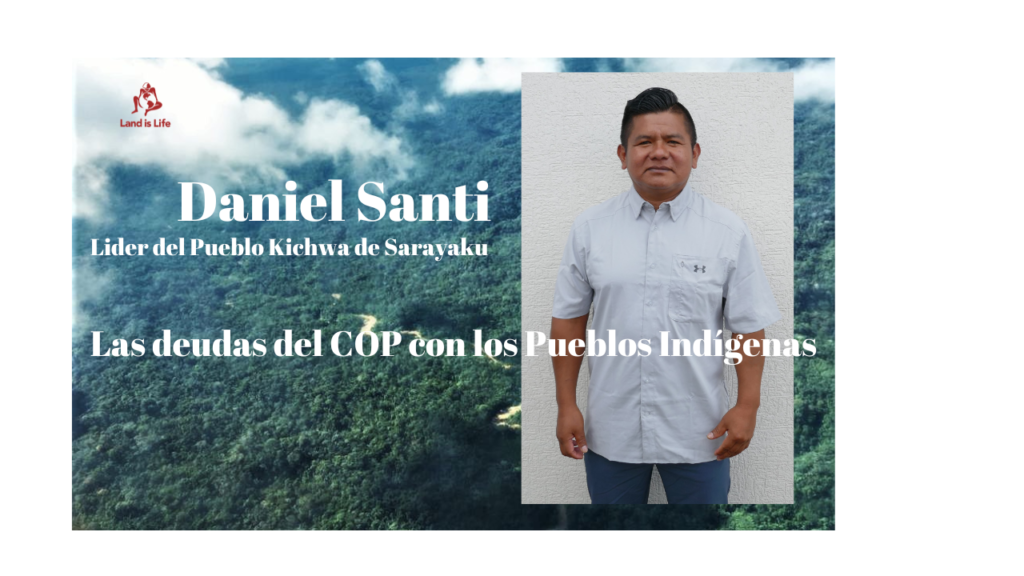
Desde 2016, los Pueblos Indígenas tienen una mayor presencia en los debates sobre cambio climático dentro del Convenio Marco sobre el Cambio Climático de la ONU. Ahora, en el contexto de la COP 28 en Dubai, los Pueblos Indígenas demandan participar de los espacios de decisión. VER VIDEO: https://www.youtube.com/watch?v=EndIhnSX6ns&pp=ygUMTEFORCBJUyBMSUZF
THE MARCO TEMPORAL IS UNCONSTITUTIONAL: LAND IS LIFE CONGRATULATES BRAZIL’S INDIGENOUS PEOPLES ON A CRUCIAL VICTORY
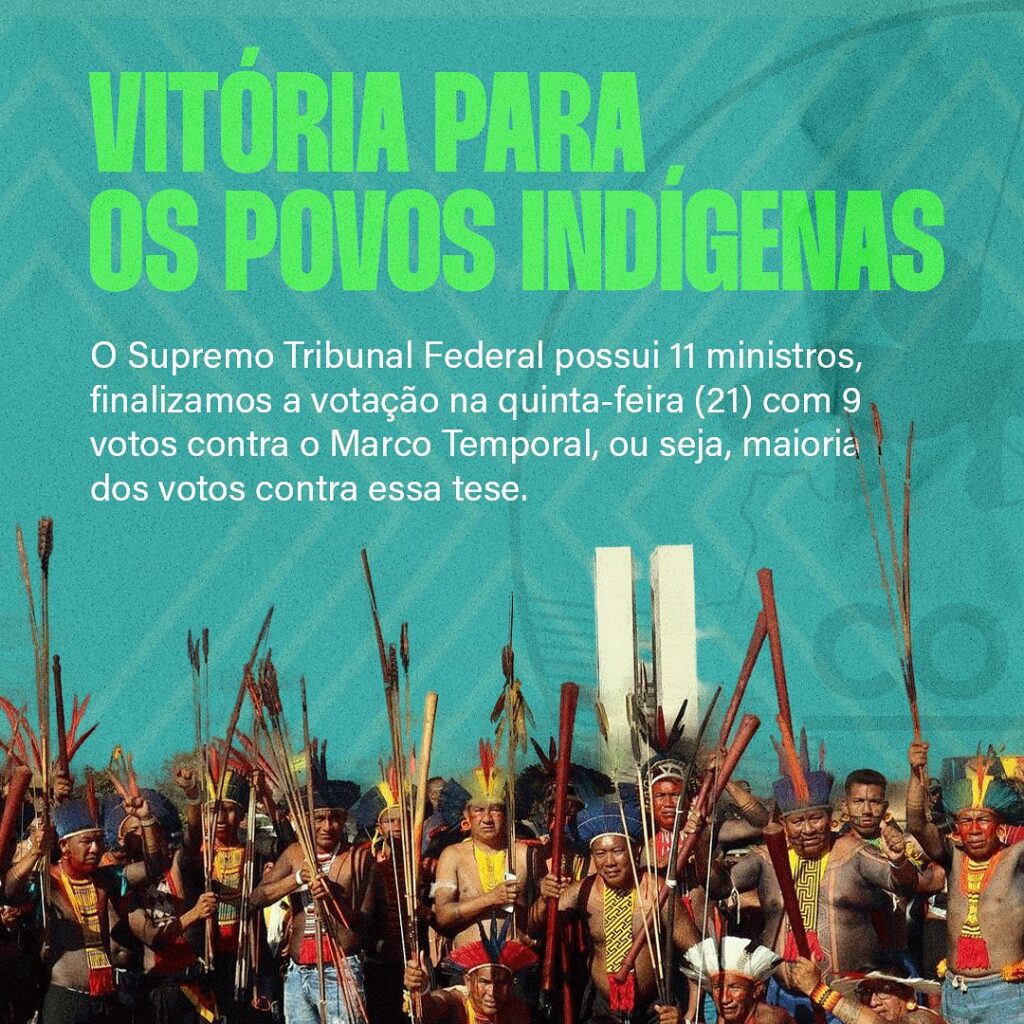
On Thursday September 21st, the Brazilian Supreme Court voted against the so called ‘Marco Temporal’, which would have forced the country’s Indigenous Peoples to demonstrate that any territories claimed as traditional, had been occupied by them prior to the Brazilian Constitution of 1988. Court magistrate Carmen Lucia stated that Brazilian Society had an unpayable debt to Indigenous Peoples. Article 231 of the Constitution grants Indigenous Peoples the right to land they have “traditionally occupied”, and according to the National Indigenous Peoples Foundation (FUNAI), 761 territories covering about 1.2 million square kilometers (almost 14% of Brazil’s territory) have in fact been claimed. But of these the government has recognized only 475, despite the fact that the 1988 Constitution also guaranteed that all claims be resolved within five years. The legal argument, promoted by the ‘Ruralist’ block of legislators representing the interests of agribusiness, miners and cattle ranchers, would have made that constitutional right time dependent, and placed the burden of proof on the Indigenous Peoples themselves. Such proof may have been difficult to produce: one of the principal reasons being that many Indigenous Peoples were forced to keep moving in order to avoid conflict with agribusiness, and illegal loggers and miners, the very people that today want to limit their rights There is little doubt that a vote in favor of the ‘Marco Temporal’ would have been disastrous for the country’s Indigenous Peoples, including the Amazon’s 144 Peoples in Voluntary Isolation, who live mainly in territories created to protect them. But the fate of Brazil’s Indigenous Peoples was not the only thing in play, the entire Amazon forest would also have been dramatically affected. Deforestation of the Brazilian Amazon is a global concern, and after the devastating effects of the Bolsonaro government’s policies, in the first year of President Lula da Silva’s third term in office, the world has seen some long desired success in reducing deforestation rates. But under the ‘Marco Temporal’ this would have represented an extremely short term victory in a much longer term war. For example, it has been estimated that up to 95% of Indigenous territories could have been affected, contributing massively to the climate crisis. According to environmental scientist Ana Claudia Rorato of Brazil’s National Institute for Space Research, and conservation biologist Celso Silva-Junior of the Federal University of Maranhão, some 87,000 to 1 million square kilometers of forest could be left unprotected. In other words, left at the mercy of the farmers, loggers, miners, cattle ranchers and others that have fought against recognizing Indigenous territories. Clearing these forests would have caused a massive increase in carbon emissions, and have moved the Amazon closer to a tipping point: a condition which would change the hydrologic cycle and begin a process in which rainforests would be turned into much dryer savanna. In sum, the ‘Marco Temporal’ would have had devastating consequences for both Brazilian Indigenous Peoples, and the Amazon rainforest and its priceless biodiversity. Land is Life applauds the combined efforts of Brazilian Indigenous Peoples and civil society organizations in the fight to avoid an extremely dangerous and short-sighted policy. However, we must continue to be vigilant, as despite this crucial victory the Ruralist legislative block will not disappear, and will surely be working hard to find other ways to achieve its objectives. Fotos @Coiabamazonia
